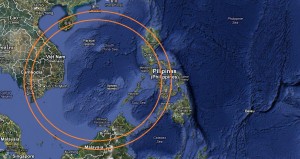
Addressing the UN on Oct. 9, Philippine Permanent Representative to the UN Libran Cabactulan also told the world body that the country’s arbitration bid against China would benefit the global community as it sought to ensure freedom of navigation in the critical trading route.
“It is paramount for all states to contribute in creating peace, order, stability and predictability in the seas. Allowing the disputes to fester for years … will perpetuate more uncertainties; it is untenable,” Cabactulan said at a committee-level meeting on the Rule of Law of the UN General Assembly.
Echoing assertions President Aquino made before the Association of Southeast Asian Nations (Asean) Summit in Brunei this week, Cabactulan said the Philippines’ legal action against China before the UN sought to ensure unhampered navigation in regional waters, where some $5.3 trillion worth of trade pass through annually.
The unresolved territorial dispute in the West Philippine Sea (South China Sea), which involves China, Taiwan and Asean member-nations the Philippines, Vietnam, Malaysia and Brunei, was a central issue in the just-concluded summit in Bandar Seri Begawan.
“[The arbitration case would be] mutually beneficial to all claimant countries and to the international community as a whole. Freedom in the high seas is essential to global peace and the stability of the international economy,” said the Philippine envoy to the UN.
In January, the Philippines brought China before the UN Arbitral Tribunal to clarify maritime boundaries in the West Philippine Sea, halt Chinese incursions into the country’s exclusive economic zone (EEZ) and nullify China’s “excessive” nine-dash-line claim covering almost all territories in the contested waters.
China has rejected the proceedings, but the arbitration continues as the Philippines is set to file a comprehensive memorandum detailing the merits of its case by March 2014. Meanwhile, Chinese intrusions continue in the disputed waters, with its ships known to be going back and forth in shoals within Philippine EEZ.
In addressing the UN, Cabactulan said the Philippines’ actions pertaining to the dispute were guided by dispute settlement provisions of the UN Charter and the 1982 Manila Declaration on the Peaceful Settlement of International Disputes.
He also cited provisions of “the constitution for the oceans,” the UN Convention on the Law of the Sea (Unclos), which the Philippines had invoked in filing the arbitration case.
“A coastal state’s maritime entitlements are only those established by Unclos. No country should make expansive and excessive maritime claims in violation of international law particularly Unclos,” Cabactulan said, in tacit reference to China.
The Philippines earlier accused China of a military buildup in the West Philippine Sea amid continuing incursions into the country’s established maritime boundaries.


